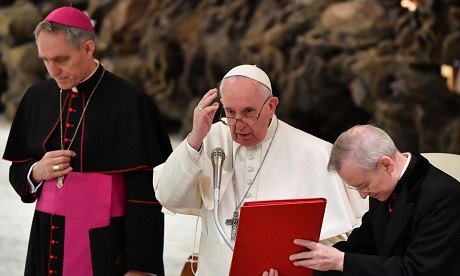Pope Francis has made it compulsory in law within the Vatican and in Vatican diplomatic missions worldwide to report child sex abuse.
Francis, who is both the Vatican head of state and the head of the Church new law, wants the new law to be a model for the church globally.
The legal changes reflect a desire to show the Church is finally acting against clerical child abuse after decades of scandals around the world.
They make it obligatory for superiors and co-workers to report abuse allegations; punish failure to report with dismissal, fines or jail; and offer assistance to victims and families.
The new law also provides protection to vulnerable adults.
The new laws define a vulnerable person very broadly. The definition includes anyone “in an infirm state, of physical or mental deficiency, or deprivation of personal freedom, that in fact, even occasionally, limits their capacity to intend or to want or in any way to resist the offence.”
The new definition radically expands the definition currently being used by the Congregation for the Doctrine of the Faith in its handling of cases from dioceses around the world. That definition says a “vulnerable” person is one who “habitually lacks the use of reason.”
This is the first time a unified, detailed policy for protecting children has been compiled for the Vatican, and its embassies and universities outside the city state.
The law sets up procedures for reporting suspected abuse, imposes more screening of prospective employees, and sets strict guidelines for adult interaction with children and the use of social media.
Any Vatican public official who learns of an allegation of abuse is obliged to report it to Vatican prosecutors “without delay.”
Failure to do so can result in a fine of up to 5,000 euros ($5,615) or, in the case of a Vatican gendarme, up to six months in prison.
The mandatory reporting provision is significant. Until now, the Holy See has justified not having a binding reporting policy for the universal church saying the accused clergy could be unfairly persecuted in places where Catholics are a threatened minority.
Since that is not a risk in the Vatican, it is now law.
“With this document the Vatican wants to send a message that it takes these crimes seriously, wants to prosecute them, to avoid cover up, and also to create an atmosphere that prevents these crimes from happening in the first place,” a canon law professor at Rome’s Pontifical Gregorian University says.
The legislation requires that victims be welcomed, listened to and provided with medical, psychological and legal assistance.
It sets the statute of limitations at 20 years past the victim’s 18th birthday.
Source
